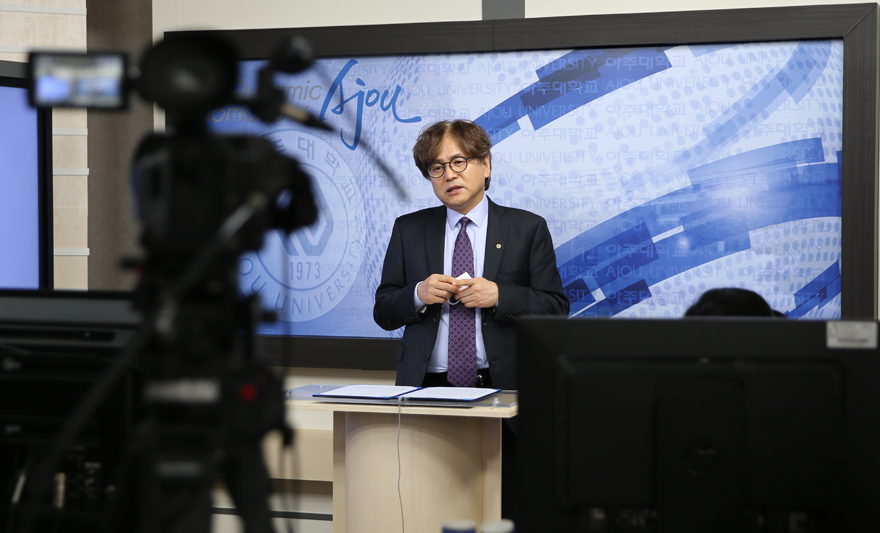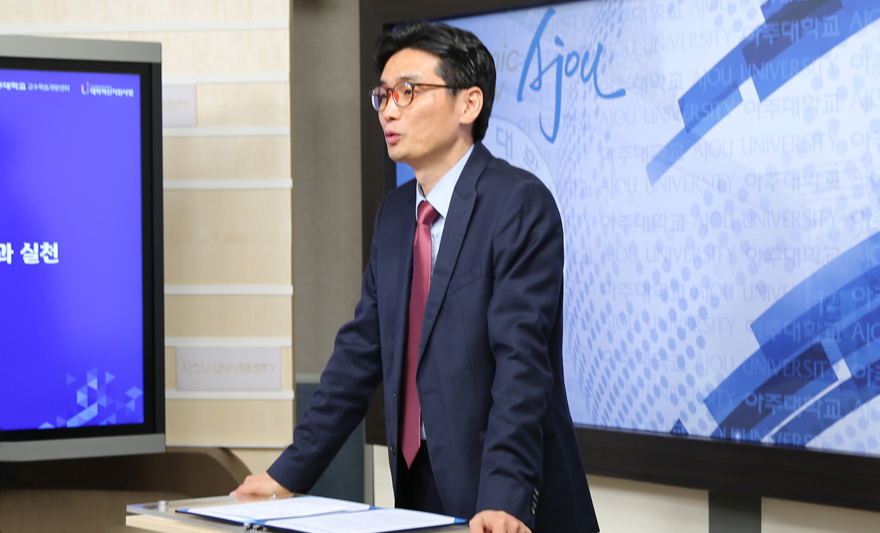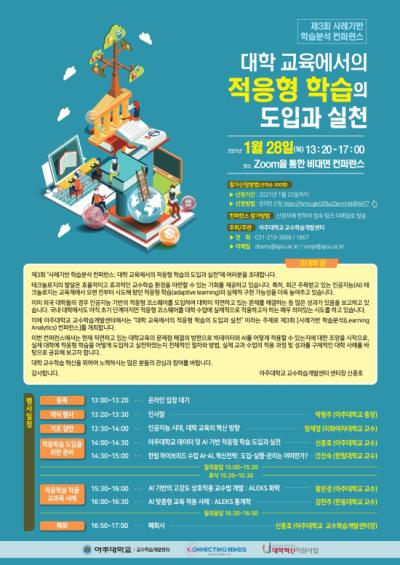- About Ajou
- Admission
- Academics
- Research
-
International
International
- Campus Life
-
News and Event
News and Event
-
AUT
AUT
Ajou News
NEW Online Conference Held on Adaptive Learning in Higher Education
- 2021-02-23
- 3601

The third Case-Based Learning Analysis Conference (CBLAC) was held on January 28, fostering debates on ways of applying artificial intelligence (AI) and big data to improve personalized learning conditions in higher education and increase the performance of adaptive learning.
The conference, held by the Center for Teaching and Learning (CTL) at Ajou University, focused on the theme of “Introducing and Practicing Adaptive Learning in Higher Education.” The entire conference was livestreamed online via Zoom and YouTube, with 140 or so participants, drawn from both inside the school and outside, in attendance.
Professor Jeong Jae-young of Ewha Womans University opened the conference with a keynote address entitled “The Age of AI: Direction for Innovations in Higher Education.” Professor Jeong introduced examples of innovation attempted by universities abroad and identified the lack of content and responsiveness in Korean universities’ AI education programs. He then stressed the necessity of changing pedagogic methods using AI.
The keynote address was followed by a panel debate on preparations for introducing adaptive learning. Prof. Shin Jong-ho of Ajou University, who leads the CTL, was the first to speak, on the theme “Introduction and Practice of Data- and AI-Based Adaptive Learning at Ajou University.”
Noting that the changing learning environment has increased the diversity of students, Prof. Shin emphasized the need to introduce personalized classes and learner-centered education methods that better cater to different students’ interests, aptitudes, and talents.
Prof. Shin then proceeded to introduce Ajou’s model of adaptive learning, which supports personalized learning environments using AI. Adaptive learning refers to a method of education that utilizes intelligent information technology, such as big data analysis and AI, to assess individual students’ levels of knowledge and competency with accuracy and dynamically adjusts the types, content, and levels of education accordingly. Adaptive learning is chiefly designed to provide personalized learning environments tailored to different students’ needs.
Since launching the development of the Ajou Teaching and Learning Analytics System (ATLAS) in 2014, Ajou University has been promoting adaptive learning on campus, culminating into the creation of the Pathway to Ajou Student Success (PASS), a data- and AI-based personalized learning system that was introduced in 2019.
Prof. Shin relayed that dividing students into different groups and applying prescriptive learning programs accordingly, with the help of Ajou’s model of adaptive learning, has improved students’ satisfaction with classes. Nevertheless, he also pointed out a number of obstacles preventing the progress of adaptive learning, including the lack of programs and curricula developed in Korea, language barriers, and resistance to the introduction of new systems. “As we are still in the early stages of adaptive learning,” he added, “it is necessary to develop more effective measures by pooling the experiences and lessons that Korean universities have gained.”
The second debate unfolded on the theme of “Adaptive Learning-Applied Syllabi.” Prof. Hwang Eun-kyung of Ajou University first spoke about “Ai-Based, High-Intensity, Interactive Teaching Method: ALEKS Chemistry.” ALEKS is a program designed to enable individual students to learn at different paces and levels of difficulty. Prof. Hwang provided classes using Ajou’s own adaptive learning system and ALEKS, and compared the results.
The professor noted that, although ALEKS automatically assessed students’ different levels of competency, the different workloads it imposed on students at different levels and the English lessons burdened some students. On the other hand, Prof. Hwang noted that Ajou’s own system enabled her to group students for group exercises based on assessment of their competency, and that such exercises significantly improved students’ satisfaction.
Concluding, from her experience, that the truly important question of adaptive learning involves deciding how to apply the information on students it provides to classroom content and learning, Prof. Hwang argued that we need to “prepare different ways of teaching other than classroom learning based on a good understanding of how the adaptive learning system works.”
Prof. Kan Jin-sook of Hallym University and Prof. Kim Heon-joo of Handong Global University also gave presentations under the themes “The AI-AL Innovation Strategy for Hybrid Learning at Hallym” and “A Case of AI-Based Personalized Education: ALEKS Statistics,” respectively.
In his official greeting, Ajou President Park Hyung-ju remarked: “Ajou’s attempts to apply data-based analyses and strategies to the evolving learning environments predate COVID-19.” He also added: “I hope, through this conference, we can share our experiences with and lessons on adaptive learning in higher education toward finding a better way forward for all Korean universities.”
The Ajou CTL provides consultation on class designs, develops new models of teaching and learning based on the latest methods, and provides learning advisory programs. The center’s scope of work has expanded recently to include content development, learning management systems, and other matters related to remote learning, allowing it to build a data-based teaching and learning support system capable of providing proactive and personalized support programs for different learning needs.

Prof. Shin Jong-ho hosting the conference

Conference poster
